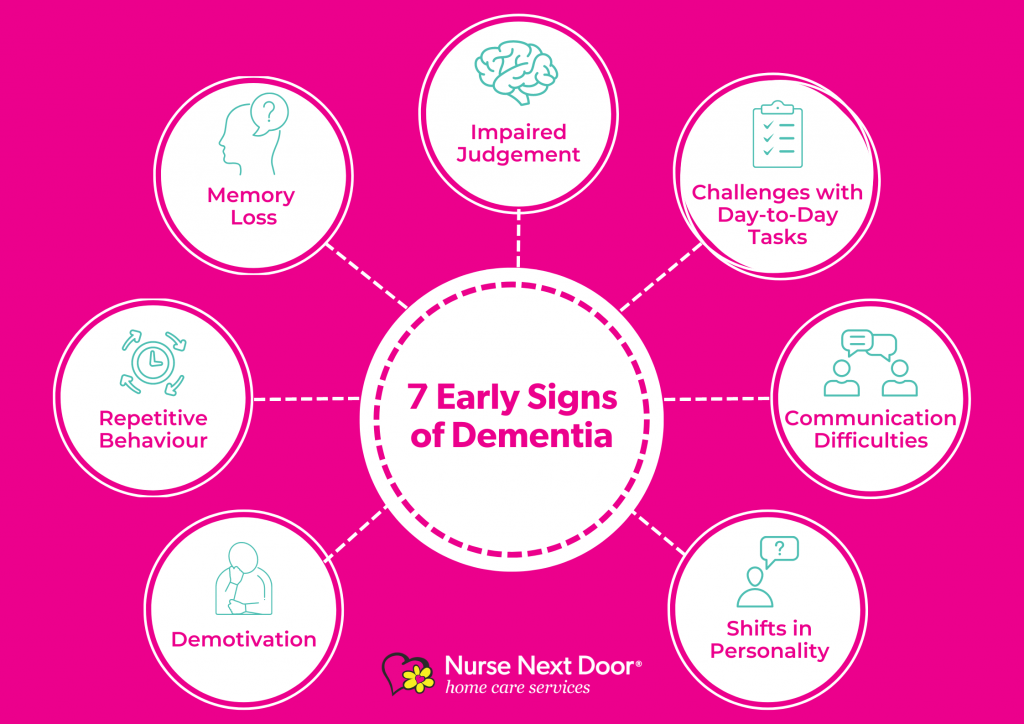7 Early Signs of Dementia
“While no one can change the outcome of dementia or Alzheimer’s, with the right support you can change the journey.”-Tara Reed
Dementia is a debilitating condition affecting millions of people worldwide. It’s a progressive disease that impacts the brain, leading to a decline in cognitive function, memory loss, and changes in behaviour. Unfortunately, there is no cure for dementia, but early detection can help slow down its progression, making it essential to recognise the early signs of the disease.
Here are some common early signs of dementia and what to look out for. It’s important to be aware of these signs so that you or your loved ones can get the necessary support and care when needed.
1. Memory Loss
2. Impaired Judgement
3. Challenges with Day-to-Day Tasks
4. Difficulty with Communicating
5. Shifts in Personality & Behaviour
6. Demotivation
7. Repetitive Behaviour


1. Memory Loss
Memory loss that disrupts daily life is one of the more common early signs of dementia. While it’s normal for everyone to forget things from time to time, like when you occasionally forget appointments, an individual in the early stages of dementia may forget things more often and at times not remember them at all. Early signs of memory loss include:
- Difficulty recalling recent events
- Misplacing objects
- Trouble finding objects
- Forgetting familiar names
These symptoms may be subtle, but they can gradually worsen over time. Lewy body dementia is a common type of dementia that causes memory problems as well as trouble speaking and impulsive behaviour.
2. Impaired Judgement
Poor judgement and reasoning may signal poor cognitive decline and be an early symptom of Alzheimer’s disease and other forms of dementia such as vascular dementia. If an individual is experiencing a decline in decision-making abilities they may begin to make poor decisions that are out of character for them including:
- Inability to manage finances
- Inability to manage personal hygiene
- Inability to identify hazards
- Inability to drive safely
Poor judgment can occur before memory loss as an early symptom of specifically for Alzheimer’s disease. Over time, reasoning and judgment can be heavily impacted and can become worse depending on the progression of the disease.


3. Challenges with Day-to-Day Tasks
If an individual starts to forget how to do familiar tasks, this could be one of the other early symptoms of dementia. A subtle change to how they behave in their daily life usually starts with more complex tasks rather than simple ones including:
- Keeping track of bills
- Following a recipe
- Playing a game with lots of rules
- Balancing a chequebook
In addition to struggling with familiar tasks, a person showing early signs of dementia will lose interest in their hobbies and passions as well as have difficulty with learning how to do new things, adapting to changes in their environment or following new routines.
4. Difficulty with Communicating
Individuals who experience cognitive decline or show early onset dementia symptoms may struggle to express themselves verbally, and have trouble understanding others. Communication difficulties can manifest in a variety of ways, including:
- Struggling to find the right words
- Forget simple words
- Becoming easily confused
- Losing track in conversations
Having difficulty communicating their thoughts or taking longer than usual to express themselves can lead to frustration and isolation for the individual, as well as confusion for their loved ones.


5. Shifts in Personality & Behaviour
Our behaviour and the way we react to our environment generally change as we age however, subtle and progressive shifts in an individual’s personality and behaviour could be warning signs of early-onset Alzheimer’s disease or other dementias. Changes in behaviour can include:
- Rapid mood swings
- Agression or agitation
- Self-isolation
- Inappropriate social behaviour
Early stages of Frontotemporal dementia will usually cause changes to an individual’s personality and behaviour first. These changes can be subtle and difficult to notice at first, but they can become more pronounced over time.
6. Demotivation
Demotivation is a common early sign of dementia that is often overlooked. The loss of interest in activities that were once enjoyable may indicate that the brain is struggling to process information and engage with the world around it. Some behaviours that an individual is losing motivation as a result of early onset dementia can include:
- Disinterest in hobbies and passions
- Trouble handling usual responsibilities
- Difficulty with managing emotions
- Difficulty planning or solving problems
Demotivation can lead to a decreased quality of life if it is not recognised, diagnosed or treated early resulting in stress and confusion for both the individual experiencing early signs of dementia as well as their loved ones. Helping loved ones maintain an active and engaging lifestyle through physical and cognitive exercises may help individuals stay mentally sharp and delay the onset of dementia symptoms.


7. Repetitive Behaviour
Repetitive behaviour can be an early sign of dementia, especially in older adults, and is most commonly caused due to memory loss and other general changes in common behavioural patterns. This behaviour can take many forms including:
- Repeating questions or statements
- Performing the same actions or tasks repeatedly
- Obsessively checking things like lights, locks, or appliances
More often than not, individuals who display repetitive behaviour are not fully aware of their actions and may not even realise they are doing them. Implementing memory aids and creating a structured routine may help individuals with dementia manage their symptoms and reduce their reliance on repetitive behaviours.
While these dementia-like symptoms can be early signs, it is important to note that these symptoms may not necessarily mean that a person has dementia, as they can also present in other conditions such as stress, depression, or even medication side effects.
Early detection of any dementia can lead to better treatment options, Dementia care and a higher quality of life for those affected. Early intervention and support can help slow the progression of the disease and improve the quality of life for the individual and their caregivers.
It is recommended that anyone who suspects they or a loved one may be experiencing early signs of dementia should seek medical advice from a qualified healthcare professional.
At Nurse Next Door, we are celebrating ageing and are passionate about Making Lives Better.
To learn more about The Power of Happier Ageing you can download our report
or contact us today on 1300 600 247 to discuss how Nurse Next Door can help you keep doing what you love.
